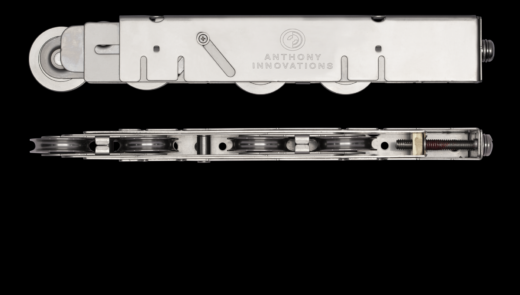Commercial sliding doors are synonymous with innovation. They offer a blend of functionality and aesthetics that redefine the dynamics of interior and exterior spaces.
In a commercial setting, their impact on spatial dynamics, accessibility, and the overall ambience of a space meets the demands of contemporary architecture beautifully. Anthony Innovations’ products are specifically engineered to carry large, heavy doors while reducing rolling resistance, making our range perfect for larger commercial operations.
From optimising space to fostering a welcoming atmosphere, let’s take a look at why sliding doors are catalysts for enhanced productivity, space optimisation in business and improved customer experiences, along with a range of other benefits.
The Evolution of Commercial Door Design
The journey of commercial sliding doors traces back to traditional Japanese design principles. For centuries, Japan has inspired architectural solutions, including innovative sliding door systems exemplified by two distinctive types of sliding doors: the fusuma and shoji doors. This Japanese influence transcended borders and entered Western architecture during the 19th century. The adoption of sliding doors, initially as pocket doors, became a hallmark of European and American homes.
Material and hardware evolution played a pivotal role in shaping sliding door trajectories. While traditional doors were fashioned from wood and paper, contemporary choices now span glass, aluminium, steel, and innovative composite materials. Glass sliding doors, particularly those without frames, have gained prominence for their sleek, minimalist aesthetic, making them popular in residential and commercial settings.
Reflecting on Industry Changes
Commercial sliding door hardware has also transformed, with advanced mechanisms and durable tracks replacing traditional wooden runners. The hardware has adapted to diverse preferences, from soft-close systems to concealed tracks and motorised options, ensuring smooth functionality and longevity. From the hardware to the door design, there are now more commercial sliding door options than you likely realise.
Aesthetic and Functional Benefits of Sliding Doors
The concept of flow in architectural design solutions, exemplified by the ancient practice of Feng Shui, is found in the sleek movement of sliding doors. These doors open and close without intruding into a room, improving flow and connectivity and creating the illusion of larger, unified spaces.
Beyond their visual appeal, sliding doors provide many benefits, such as maximising natural lighting within commercial spaces. Unlike traditional hinged doors, sliding doors allow the passage of light even when closed. Space optimisation in business is vital, and avoiding a traditional door’s swinging arc ensures that every inch of available space is utilised efficiently. Hidden sliding doors, whether pocket doors or cavity sliding doors, enable the transformation of small rooms into functional spaces without compromising aesthetics or obstructing the flow of movement.
Technical Excellence with the QUADZilla Series
Anthony Innovations QUADZilla Series represents a significant leap forward in door technology, boasting the remarkable ability to move panels weighing up to 600kg.
The award winning QUADZilla Series is designed to fit within the standard 4600 Series rail profile. It makes building larger sliding panels possible, whilst delivering reduced rolling resistance and smoother, quieter operation.
The QUADZilla Series is adaptable across diverse systems and materials within its specified weight capacity. It retains structural integrity during and after installations, thus reducing installation times and ensuring product durability and longevity.

Tailoring Brand Identity Through Design
Beyond being functional access points, sliding doors can leave an impression on customers and stakeholders. Businesses that integrate their brand colours, logos, and unique design elements into the sliding door aesthetics create visual cues that strengthen brand recall.
The architectural design of a space, including the choice of sliding doors, contributes significantly to the overall ambience. Sliding doors can allow you to communicate your brand messaging, mission, vision, or core values. Use them to reinforce the brand identity and connect with customers by expressing an ethos through a tangible and visible medium.
Commitment to Sustainability and Energy Efficiency
Anthony Innovations is taking a significant step towards energy-efficient designs by transitioning the plating of its metal components from Hexavalent Chromium to the more environmentally friendly Trivalent Chromium process. This strategic move addresses health, safety, and environmental concerns and reinforces the company’s commitment to delivering sliding doors that prioritise long-term sustainability.
The decision to phase out Hexavalent Chromium aligns with regulatory trends and a broader commitment to energy efficiency and environmental stewardship. Trivalent Chromium is backed by 3rd-party independent testing to meet the stringent AAMA 907 Corrosion testing standard. Our engineering team has conducted even more corrosion tests to ensure we provide comparative results between the two processes and assure customers of the new plating’s effectiveness.
Commercial Door Installation FAQs
What type of sliding door is right for you?
- Sliding “patio” glass doors are a traditional and affordable option perfect for smaller spaces.
- Multi-sliding “stacker” glass doors use three or more panels, maximising openings and maintaining affordability.
- Cavity “pocket” sliding doors offer a grand look and a seamless indoor-outdoor experience.
Where should you install your sliding doors?
The situation often determines the use of sliding doors. For example, hidden sliding doors are perfect for opening space in smaller areas, providing a sleek, space-saving solution. Outdoor spaces can benefit from sliding doors to bring the outside in with natural light. It’s also important to consider that sliding doors with shatterproof glass are safe in areas prone to accidents.
What door material should you consider?
There are plenty of options, and we often recommend suiting the material to the space’s aesthetic. Glass is ideal for improved aesthetics; wood is traditional and classic, offering warmth and charm; aluminium is modern, durable, and corrosion-resistant; and vinyl is a low-maintenance, energy-efficient, and cost-effective solution.
Reach out to Anthony Innovations for bespoke sliding door solutions today
Anthony Innovations specialises in designing and manufacturing high-spec solutions suitable for a range or commercial applications. Speak with our expert team today and see how you can improve the aesthetics and operations within your space to ensure your business thrives.




